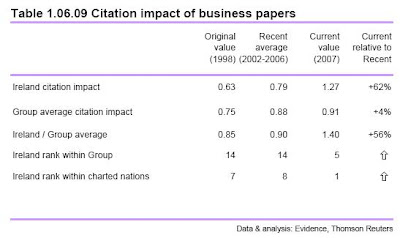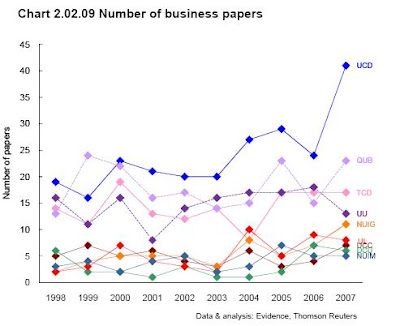The simplest comparison is between average weekly earnings in the public and private sectors as shown in the following graph.
 For the six quarters available there seems to be a slight upward trend in public sector wages (up 4.2% since Q1 2008) with a slight downward trend in private sector wages (down 4.0%). Note though that these are gross earnings that do not take account of the public sector pension levy introduced in April 2009. Looking at more disaggregated data. Click to enlarge.
For the six quarters available there seems to be a slight upward trend in public sector wages (up 4.2% since Q1 2008) with a slight downward trend in private sector wages (down 4.0%). Note though that these are gross earnings that do not take account of the public sector pension levy introduced in April 2009. Looking at more disaggregated data. Click to enlarge. It is clear that despite much media coverage and enecdotal evidence that average weekly wages are not falling rapidly. For the year to Q2 2009 weekly earnings are down only 1.1% (public sector +1.3%, private sector -3.1%)
It is clear that despite much media coverage and enecdotal evidence that average weekly wages are not falling rapidly. For the year to Q2 2009 weekly earnings are down only 1.1% (public sector +1.3%, private sector -3.1%)The sectors that shows the biggest annual falls are finance, insurance and real estate (-13.3%), transportation and storage (-3.5%) and professional, scientific and technical (-1.8%). The biggest increases were in education (+1.0%), public administration and defence (+0.7%) and industry (0.6%).
However it is important to note that these wage measures are not calculated with a weighted index like the CPI but is simply the total wage bill divided by the numbers employed. As John Fitzgerald points out:
These data are designed to give us good information on the wage bill. They are not well designed to give us information on pay rates.If we turn to the numbers employed in each sector. Again click to enlarge.
The data on average hourly earnings and average weekly earnings are generated by aggregating the wage bill for a sector and dividing through by the total employment or total hours worked. With most of the loss of employment being among the lower paid “production, transport, craft and other manual” category this shows up as an increase in average earnings, even if there is no change in pay rates. This biases upwards the figures significantly.
This problem could be ameliorated by creating an index where the changes in each individual category were weighted by the wage bill for that category.

Here we see some far stronger trends. The biggest annual drops in the number of employees are construction (-19.5%), administrative and support (-13.9%), information and communication (-12.5%), industry (-9.8%) and accommodaton and food service (-9.1%). The only sectors to see an increase in employment are education (+1.0%) and human health and social work (+2.2%)
By combining the average earnings with the numbers of employees we can get an insight into the wage bill in different sectors. Returning to the crude public/private comparison.
 This suggests that the public sector earnings have been relatively constant (annual change +0.07%) while aggregate earnings in the private sector have fallen (-10.7%). Again it should be noted that the public sector figures exclude the pension levy and it will be the Q1 2010 data before the paycuts announced in the recent Budget will be seen. If we move to the data by sector.
This suggests that the public sector earnings have been relatively constant (annual change +0.07%) while aggregate earnings in the private sector have fallen (-10.7%). Again it should be noted that the public sector figures exclude the pension levy and it will be the Q1 2010 data before the paycuts announced in the recent Budget will be seen. If we move to the data by sector. It is clear that total earnings in many private sector parts of the economy have fallen quiet significantly. Construction (-20.5), financial, insurance and real estate (-15.9%), administrative and support (-14.4%) and information and communication (-12.1%) say the biggest increases with education (+2.1%) and health and social work (+2.5%) the only sectors to see an annual increase in total earnings. These are parts of the economy dominated by public sector provision.
It is clear that total earnings in many private sector parts of the economy have fallen quiet significantly. Construction (-20.5), financial, insurance and real estate (-15.9%), administrative and support (-14.4%) and information and communication (-12.1%) say the biggest increases with education (+2.1%) and health and social work (+2.5%) the only sectors to see an annual increase in total earnings. These are parts of the economy dominated by public sector provision.The conclusion is that there have been some mild falls in average gross earnings but the financial, insurance and real estate sector aside these have been insignificant. Although not shown there have been drops in net pay in the public sector as a result of the pension levy. There will also be a drop in gross pay in Q1 2010. These drops in average earnings have generally not been evident in the private sector.
The biggest impact on pay and earnings in the private sector has been through decreases in the number of employees with large drops across a range of areas. Numbers in the public sector have shown only small decreases but earnings have been reduced through cuts in net earnings.

















